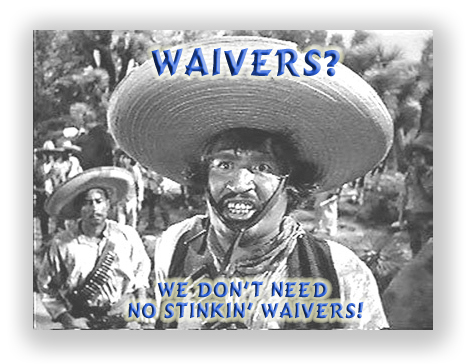We post news and comment on federal criminal justice issues, focused primarily on trial and post-conviction matters, legislative initiatives, and sentencing issues.

ONE AIN’T DONE
 A lot of possible objections or defenses can be waived if they aren’t raised at the right time. If a defendant doesn’t raise an objection to the indictment or venue or speedy trial before the jury is seated, the objections are lost. Rule 12 of the Federal Rules of Criminal Procedure lists a whole bevy of such issues.
A lot of possible objections or defenses can be waived if they aren’t raised at the right time. If a defendant doesn’t raise an objection to the indictment or venue or speedy trial before the jury is seated, the objections are lost. Rule 12 of the Federal Rules of Criminal Procedure lists a whole bevy of such issues.
Many other rights are often waived if the defendant enters into a plea agreement with the government. Such rights, which have to be specifically and expressly waived in the plea agreement, usually include the right to appeal, the right to file other types of post-conviction challenges, and even – often enough – the right to file requests for documents under the Freedom of Information Act.
A plea waiver is common and enforceable. But the government has to raise the defense of plea waiver in order to get any traction. Let’s say a defendant signs a plea deal with the government that includes a promise not to appeal or bring a collateral attack on a conviction or sentence. Later, she files a habeas corpus motion under 28 USC § 2255 claiming, for example, her lawyer screwed up at sentencing. If the government doesn’t raise the plea waiver as a defense at the time it files its objection to the § 2255 motion, it can’t come back later and assert the defense.
It’s “one and done.”But how long is “done?” Derrick Borden found that out last week. Despite having signed a plea waiver that prevented any post-conviction challenges to his conviction, Derrick filed motion to vacate his 18 U.S.C. § 924(c) conviction after the Supreme Court’s decision in United States v. Davis invalidated the basis for that count. The government, agreeing that the § 924(c) conviction should be vacated, did not raise the plea waiver as an objection.
After the § 924(c) was vacated, Derrick was resentenced. Not liking how that turned out, he appealed the new sentence as being too much. The government raised the plea waiver as a defense to the new § 2255, arguing Derrick had no right to appeal.
Derrick argued that the government – having waived its right to invoke the waiver against his first § 2255 motion – was not allowed to selectively enforce the plea deal, and that the letter it wrote the district court waiving the waiver the first time around should be read to have abandon its right to enforce the waiver for all time.
 Last week, the 2nd Circuit turned him down, apparently a bit miffed that Derrick tried to sandbag the government for having done the right thing. “To start, the Circuit said, “consenting to permit Borden to move to vacate his § 924(c) conviction was in Borden’s interest, in the interest of judicial economy, and in the interests of justice… we see no reason to discourage the Government from consenting to the correction of a constitutional error by offering limited relief from an appeal waiver (or waiver of other post-conviction relief) that benefits the defendant.”
Last week, the 2nd Circuit turned him down, apparently a bit miffed that Derrick tried to sandbag the government for having done the right thing. “To start, the Circuit said, “consenting to permit Borden to move to vacate his § 924(c) conviction was in Borden’s interest, in the interest of judicial economy, and in the interests of justice… we see no reason to discourage the Government from consenting to the correction of a constitutional error by offering limited relief from an appeal waiver (or waiver of other post-conviction relief) that benefits the defendant.”
The 2nd said the government’s letter let Derrick “obtain precisely the relief he sought. And although courts construe plea agreements strictly against the government, that standard does not necessarily extend to a letter that is not a separate plea agreement upon which the defendant relied in waiving any rights.
United States v. Borden, Case No. 19-4316-cr, 2021 U.S. App. LEXIS 32030 (2d Cir., Oct. 26, 2021)
– Thomas L. Root

